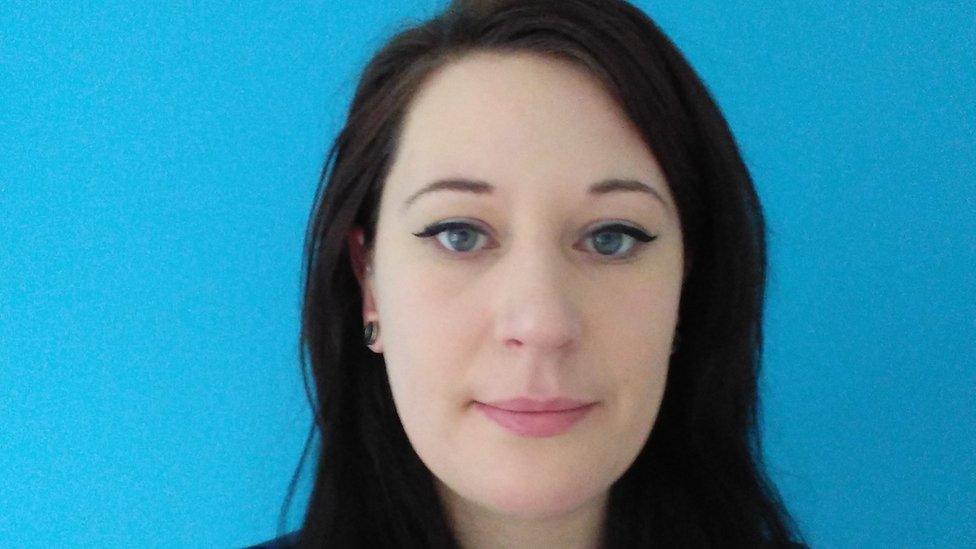The health service taking a holistic approach to patients
- Published
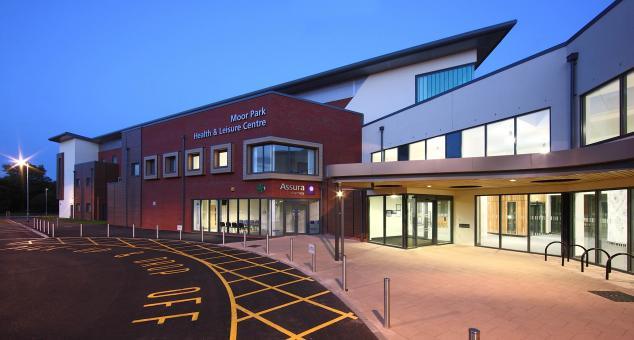
Moor Park Health and Leisure Centre where you can swim and also see a doctor
"My colleagues think I'm mad," says Dr Andrew Weatherburn.
As a consultant in geriatric medicine, he is an unlikely addition to the Moor Park Health and Leisure Centre, where schoolchildren queue for swimming lessons and people grab coffees between Zumba lessons.
"Moving out of the hospital and into the community is the best thing I've done as a consultant."
Dr Weatherburn works on the Fylde Coast, an NHS Vanguard area. The local health service here is pioneering a new model of working, which could become a blueprint for the rest of the NHS.
Diagnosis
Blackpool and Fylde suffer from many of the problems that plague the NHS nationally. With constantly increasing demand and a shortfall in supply, the local services have been under considerable strain for years.
Add to that a higher than average elderly population, which is set to double by 2030, and the local health service begins to look unsustainable.
"It's about 3% of our population that use about 50% of the resources," says Dr Tony Naughton, the head of the clinical commissioning group in Fylde.
As a part-time GP, he understands the need for an accurate diagnosis so their first innovation was to use patient data to work out who was actually using the services.
They were predominantly elderly and tended to suffer from more than one long-term condition. Rather than waiting for these patients to arrive at A&E, the Fylde Coast district set up the Extensive Care system, targeting resources on actively trying to keep them healthier.
Extensive care model
Rather than providing temporary fixes every time a patient is in hospital, this model takes a more holistic approach.
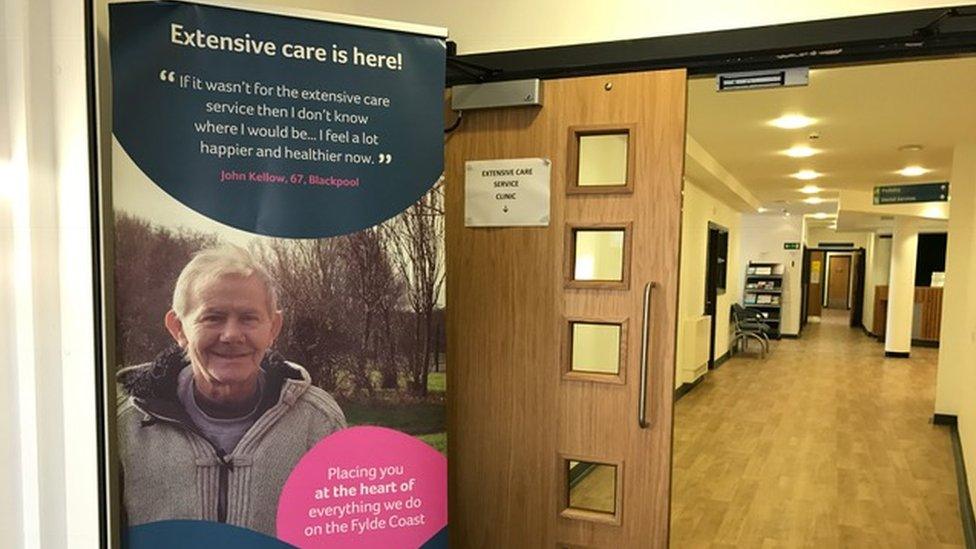
The Extensive Care clinic allows patients to have all their health needs addressed together
"These patients were going off to see a kidney specialist and then a diabetic specialist and then a heart specialist. They had a career in attending hospital, whereas this service wraps all of those outpatients appointments together and looks at each person as an individual, rather than as a heart or as a kidney."
Dr Naughton explains that to make this more joined up system work, it was taken out of the rigid departmental structure of the hospital and placed firmly in the community.
Dr Weatherburn, at his clinic in the leisure centre, believes the benefits are obvious. "I definitely know my patients much better now."
While in hospital, he would have had about 10 minutes to assess a patient's most urgent needs. Now every patient who is referred to them receives a thorough two-hour assessment with a group of medics, who then hold a meeting to come up with a co-ordinated treatment plan for each one.
Broader social issues
This system uses welfare workers as well as medics to manage each patients needs.
"Somebody may come in with a chest infection, but that maybe because they're not eating properly or they have a damp house. Now, I can't write a prescription for a dry house, but I can put them in touch with someone who can help with their housing problem," explains Dr Naughton.
The welfare workers spend more time with the patients, helping them with broader social issues and finding ways of managing their illnesses at home. Their job is really to empower patients to take control of their own health.
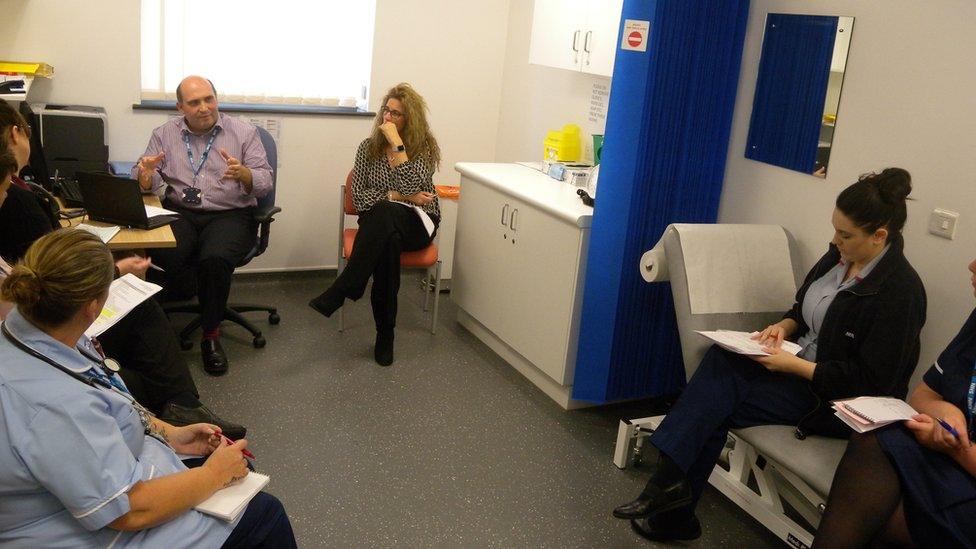
A thorough assessment means the team can come up with a co-ordinated treatment plan
Dr Weatherburn says it is working. "It's often the little things that made the big difference. It's not the big medical interventions and fancy tests, it's helping with loneliness, and helping the carers and families as well."
This may sound expensive, but the scheme should pay for itself. The new welfare workers are not medically trained so employment costs are lower, but their intervention can solve underlying problems which keep people coming back to A&E.
The results are certainly impressive. After a year-and-a-half of trialling the scheme, the Fylde Coast has already seen 13% fewer attendances at A&E, and 23-24% fewer outpatient attendances.
The patient's tale
When Lily Greenwood's husband, Peter, left hospital after suffering from a stroke, they were referred to the Extensive Care service.
"The doctor sent us here. We didn't want to come, but it's been the best thing ever."
Although Lily wasn't the patient, the team's approach of looking at every aspect of the patient's well-being, meant that attention turned to 80-year-old Lily too, as Peter's sole carer. The team helped her to take control.
"It took its toll on me at the beginning, but now, I just feel that with coming here, we can cope with it."
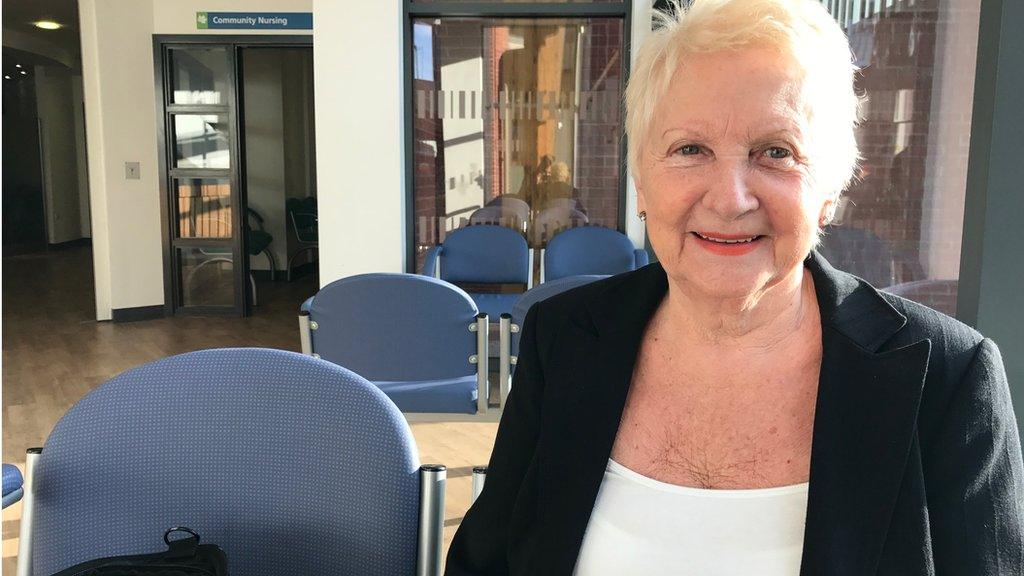
The Extensive Care system helped look after Lily Greenwood's needs as well as those of her husband
The team filled in all the forms that Lily had been baffled by, they helped her to apply for the extra benefits she was entitled to and, most importantly, they helped her to manage her husband's condition.
They even introduced her to local support groups for carers so that she no longer feels alone or overwhelmed.
"The nurses to me are friends. They have time for you. We're a lot happier now. I feel I can cope with Peter now."

NHS Health Check

A week of coverage by BBC News examining the state of the NHS across the UK as it comes under intense pressure during its busiest time of the year.

Neighbourhood teams
Given their success in reducing pressure on A&E departments, Blackpool and Fylde applied a similarly local, holistic model of care to a broader section of the population.
Every neighbourhood received its own dedicated team of therapists, nurses and welfare workers who could treat patients at home in order to reduce the pressures on GP surgeries.
"It's a cultural change. We don't just do the therapy and rush to the next appointment, we think about a patient's overall well-being."
Lucy Leonard is part of a neighbourhood team in Blackpool. Having been an occupational therapist for 17 years, she knows the NHS is notoriously resistant to change. Yet, she insists, this system is being embraced by patients and practitioners alike.
"Sometimes people can feel a bit frightened and threatened by change, especially when they worry about their professional identity and being asked to do new roles, but really, it's just about putting the patient at the heart of what we do."
This system has been a success on the Fylde Coast, and the principles could be replicated across the country. By investing in a more holistic approach, not only has the pressure on hospitals and GP surgeries been eased but, vitally, people are healthier and better able to manage their health too.
- Published8 February 2017

- Published8 February 2017
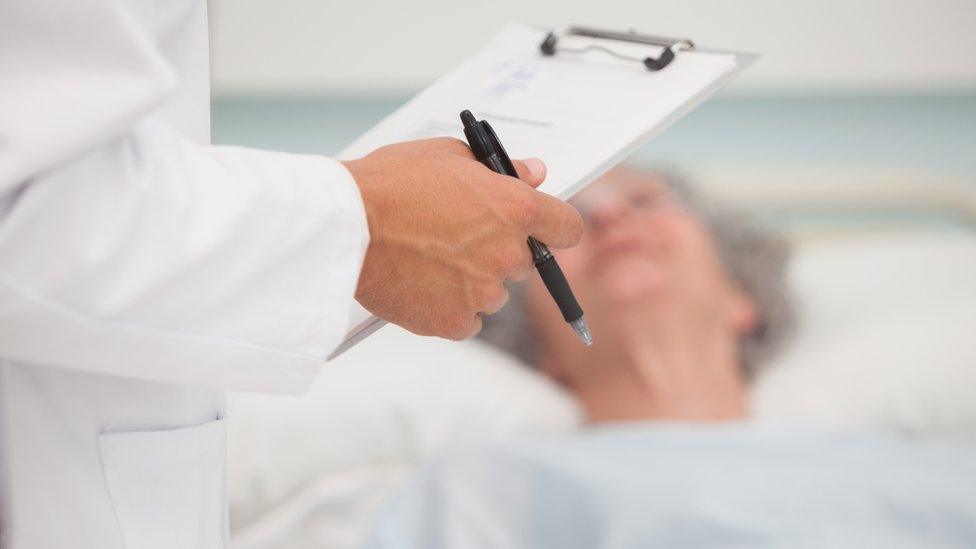
- Published7 February 2017
